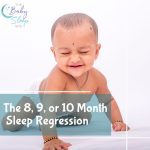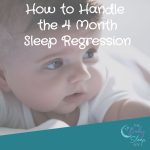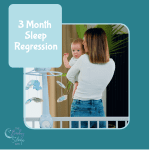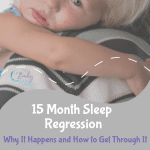
Your sweet toddler, who’s been sleeping peacefully at night, is suddenly waking up a lot at night and crying. Your toddler, who’s been taking long naps each day for ages, suddenly begins resisting nap time, refusing to lie down and go to sleep. Sound familiar? You may be experiencing the 18 month sleep regression. In this article, I’ll share more about this toddler sleep regression based on my 15+ years as a sleep consultant.
In this article:
- Introduction to Sleep Regressions
- What is a Sleep Regression?
- 18 Month Sleep Regression Causes
- Why the 18 Month Sleep Regression is One of the Hardest
- Tips to Get Through the 18 Month Sleep Regression
- Is This The Same as the 19 or 20 Month Sleep Regression?
- More Resources for Your 18 Month Old
Introduction to Sleep Regressions
If you’re the parent of a toddler, then a sleep regression is something you’re probably familiar with. After all, you’ve no doubt experienced the following sleep regressions:
- 4 month sleep regression
- 8-9 month sleep regression
- 10 month sleep regression
- 12 month sleep regression
- 15 month sleep regression
And if that’s not all, after you get through this 18 month sleep regression, there’s a 2-year sleep regression, too!
So what’s a tired parent to do? This article will outline what the 18-month regression looks like, why it happens, why it can be one of the hardest, and what steps you can take to survive it.
You May Also Be Interested In…
- Toddler Sleep Secrets, a FREE e-Book by The Baby Sleep Site®
- The 5-Step System to Help Your Toddler Sleep
What is a Sleep Regression?
Most people use “sleep regression” to mean that a baby or toddler, who’s been sleeping well, suddenly (often without any warning) begins waking frequently at night and/or refusing to nap during the day. These regressions usually last for a period of time (anywhere from 2 to 6 weeks). Then the baby’s sleep returns to its normal patterns. Toddler sleep regressions tend to be more challenging since toddlers are more vocal and more persistent.
18 Month Sleep Regression: Causes and Why 18 Months?
Every sleep regression can be connected to a baby’s mental and physical development at that particular age. The same is true of the 18-month regression. 18-month-olds experience some developmental milestones that can negatively impact their sleep. Of course, as with all sleep regressions, this one can start early at 17 months old or as late as 19 or 20 months old. All children develop on their own unique timelines.
- Teething could be to blame. Around 18 months, children are cutting the 4 canine teeth as well as their first molars. This can cause discomfort that leads to disrupted sleep.
- Separation anxiety is still an issue for toddlers at 18 months. Most babies begin experiencing separation anxiety around 7 or 8 months, and for most babies, the anxiety is strongest from 10-18 months. This can lead to disrupted sleep as well — your toddler might resist naps because he doesn’t want to be away from you, or he may wake at night and become upset that you’re not in the room with him.
- 18 month olds are gaining lots of independence and are able to do more for themselves. Children at this age are learning to feed themselves with a spoon, drink from a cup, build with blocks, and even take off some articles of clothing. This growing independence can lead to a stronger will, which means a baby may start exerting herself when she doesn’t want to go to sleep or stay in bed.
- In my many many years of experience as a sleep consultant, I find that toddlers start getting hungry at night sometimes, again. You might need to consider whether meals need to be bigger or if you need a bedtime snack. Toddlers, at this age, can be VERY active!
- Schedules sometimes change around this age, too. While most toddlers are still napping 5 hours after waking up, there are some who can now stay awake a bit longer. Be sure to check out a few of our toddler schedules to make sure you are using the right one for your toddler.
18 Month Sleep Regression: Why It’s One Of The Hardest Sleep Regressions Of All
All sleep regressions are difficult and exhausting, but the 18-month sleep regression can be one of the hardest, for one simple reason. There’s a discipline factor involved in this regression that wasn’t present in the earlier ones. The previous regressions didn’t have anything to do with independence-seeking behavior on your baby’s part, but this one does.
Being sleep-deprived always makes parenting harder. Add to this the fact that your 18-month-old is likely starting to throw “temper tantrums” and exhibit challenging behavior as he strives for independence, and parenting can seem downright impossible! The stress of dealing with your toddler’s behavior compounds the exhaustion you’re already feeling.
What’s more, these two elements (your toddler’s newfound sleeplessness and your toddler’s more challenging behavior) can end up influencing each other. Your toddler’s willful behavior can lead him to refuse naps or to shriek for you each time he wakes at night. And of course, the lack of sleep caused by this regression can make your little one cranky, which leads to more tantrums and more temper.
18 Month Sleep Regression Tips and Hints
While there is no way to “fix” any sleep regression, including the 18-month sleep regression, there are steps you can take to minimize your baby’s sleeplessness (and your own!)
Again, part of the challenge of the 18-month sleep regression likely has to do with the fact that your toddler is heading into the “Terrible Twos” and is starting to show some independence-seeking behavior. This is the time to begin setting limits for your toddler and enforcing loving discipline. Not only will this help minimize sleeplessness, but it’ll also help you develop a good foundation. This foundation will make your baby’s twos and threes a little smoother!
Continue to follow your consistent bedtime routine as much as possible to promote good nights and longer naps. This is also a good time to reinforce a lovey or stuffed animal to ease any separation anxiety.
Should You Keep the Nap?
If your baby’s extremely resistant to naps during the 18-month sleep regression, you may feel tempted to just drop the nap altogether. Again, we recommend that you don’t. Most toddlers don’t drop their naps and transition to rest time until between three and four years old, so don’t quit just yet!
You May Also Be Interested In…
Should You Stop Sleep Training? Is It Okay to Let Your Toddler Cry It Out (CIO)?
If you’re in the midst of sleep training when the 18-month sleep regression hits, you may wonder if you should just throw in the towel for a while. We recommend that you don’t. Keep sleep training! Your toddler should still fall asleep as independently as possible. If your toddler wakes up in the middle of the night, they should fall back to sleep as independently as possible, too.
It’s true that sleep training likely won’t produce fantastic results during this phase, but remember that you don’t want to promote bad sleep habits during a stage that is ultimately temporary. As we tell many families, you don’t want to make or continue long-term habits for a short-term phase.
Fall back on old sleep coaching techniques, if necessary, even if that means Cry It Out. If you have successfully done sleep coaching before, try implementing old sleep coaching techniques to get you through this phase. Sleep coaching techniques such as fading, The Ferber Method (aka Check-and-Console), or cry it out can help you survive the 18-month sleep regression without falling back into old patterns.
You May Also Be Interested In…
Is This the Same as the 19 or 20 Month Sleep Regression?
Yes, generally speaking, the 19 or 20 month sleep regression is the continuation of the 18 month sleep regression. All children develop at different rates so your toddler might start a 6-week sleep regression at 18 1/2 months which would take you to 20 months old, for example.
18 Month Sleep Regression Conclusion
Remember that the 18-month sleep regression is a phase that lasts for 3-6 weeks, on average. It can feel like an eternity when you’re enduring it and may have you feeling even less confident as a parent. But… it won’t last forever! If your baby normally sleeps well and you feel confident that her recent sleeplessness is due to the 18-month regression, be as patient as you can and wait it out.
More Resources for Your 18 Month Old
For more details on handling the 18-month sleep regression, check out our special members-only resources in our VIP Members Area:
- 17 Month-Old Case Study – Transitioning from CoSleeping
- Sleep Regressions Audio Recording with Founder
- The 5-Step System To Better Toddler Sleep e-Book
- “Ask the Author” with a sleep consultant








